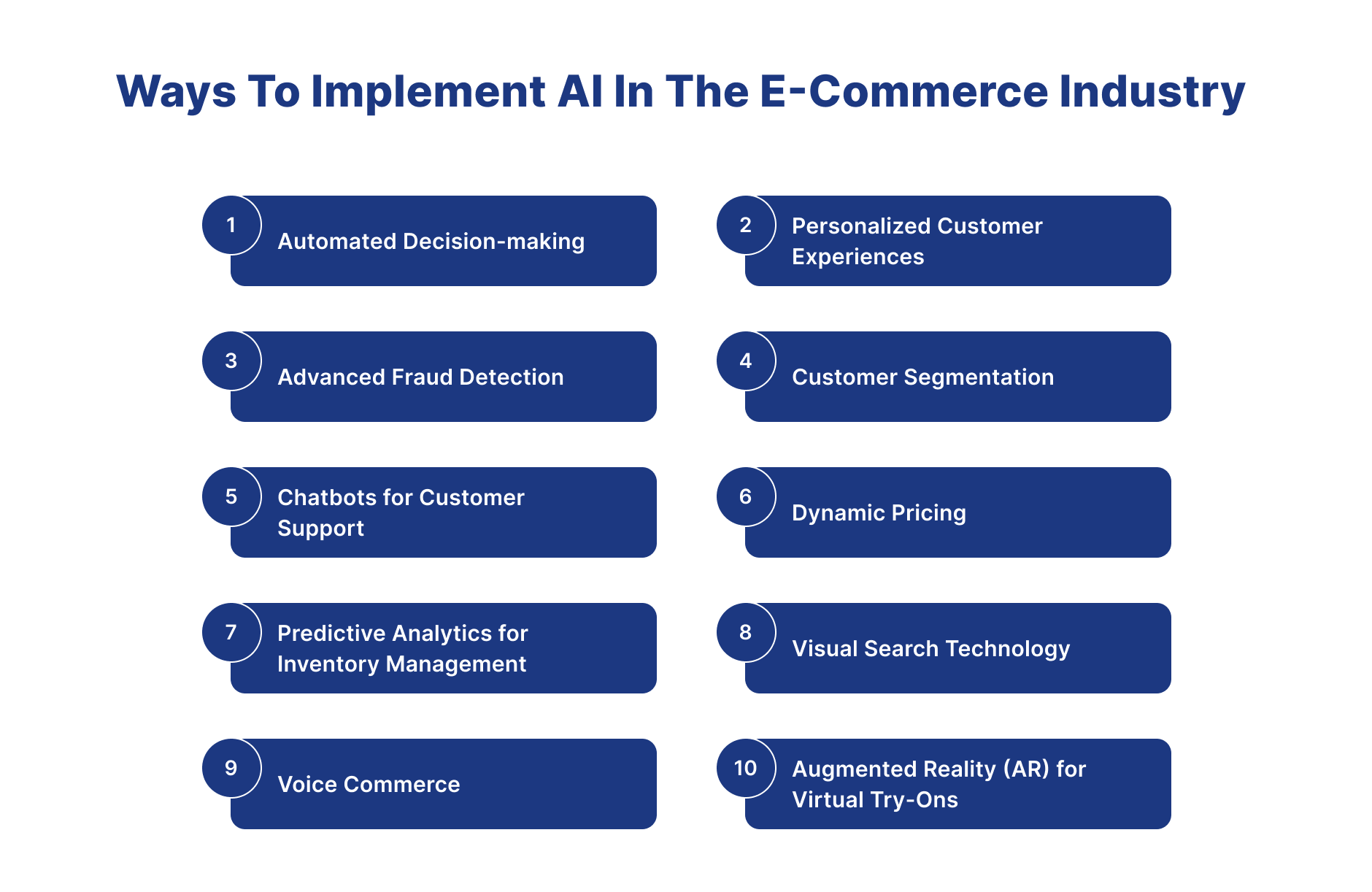AI In The E-Commerce Industry: 10 Ways Of Implement AI To Transform The E-commerce Industry
Implementing AI in the e-commerce industry has enormous potential for achieving these objectives and gaining a competitive advantage.
Introduction
- Artificial intelligence (AI) has become a game changer in a variety of businesses, including e-commerce. As online shopping grows in popularity, businesses are looking for new methods to improve consumer experiences, streamline processes, and increase revenues. Implementing AI in the e-commerce industry has enormous potential for achieving these objectives and gaining a competitive advantage.

- Companies may acquire and analyse massive volumes of data using AI algorithms and machine learning techniques to get important insights into client preferences, behaviours, and trends. This data may be utilised to make highly targeted and personalised product suggestions, resulting in improved customer satisfaction and conversion rates.
Ways To Implement AI in the E-commerce Industry

1.Automated Decision-making:
-
Many E-commerce enterprises depended significantly on manual decision-making processes prior to AI integration. This frequently resulted in inefficiencies, delays, and errors in critical areas including inventory management, pricing tactics, and customer service.
-
AI in the E-commerce industry allows for automated decision-making processes. Machine learning algorithms sift through massive volumes of data to optimise inventory levels, pricing tactics, and supply chain management, minimising human error and enhancing efficiency.
2.Personalized Customer Experiences :
-
Traditional e-commerce systems struggled to give users personalised experiences. Customer satisfaction and conversion rates were lower as a result of a lack of specialised advice and targeted marketing efforts.
-
AI in the E-commerce Industry give personalised product suggestions, and AI-driven recommendation engines analyse user behaviour, preferences, and historical data. This improves not only the consumer experience but also sales and customer loyalty.
3.Advanced Fraud Detection:
-
Detecting and stopping fraudulent operations was a major difficulty. Manual monitoring techniques were frequently ineffective in detecting complicated fraudulent patterns, resulting in financial losses and reputational harm.
-
Machine learning algorithms are used by AI-powered fraud detection systems to spot trends that indicate fraudulent activity. These systems are constantly learning and adapting to new threats, providing a strong defence against developing fraud strategies.
4.Customer Segmentation:
-
Businesses faced significant hurdles in recognising and efficiently segmenting their client base in the conventional E-commerce market. Manual techniques for client segmentation were frequently time-consuming, imprecise, and lacked the depth necessary to appreciate individual consumers' various tastes and behaviours.
-
The incorporation of AI in the E-commerce industry has heralded a new age of client segmentation, overcoming the issues that the conventional technique encountered. Businesses may now reach a degree of segmentation that exceeds manual skills thanks to sophisticated algorithms and data-driven insights.
5.Chatbots for Customer Support:
- Customer assistance in the old arena of E-commerce was frequently characterised by manual, time-consuming operations that struggled to satisfy the growing needs of consumers. Businesses faced a number of difficulties in delivering timely and effective customer care, which hampered the entire customer experience.

- The use of AI in the E-commerce Industry has transformed the landscape of E-commerce customer service, offering Chatbots as a game-changing alternative. These AI-powered bots have not only solved the shortcomings of traditional customer service, but they have also improved the whole consumer experience.
6.Dynamic Pricing:
-
Pricing tactics in the conventional E-commerce environment were largely static and frequently failed to adjust to the market's dynamic nature. Traditional pricing strategies presented various obstacles to businesses, limiting their capacity to optimise income and adapt quickly to market developments.
-
The incorporation of AI in the E-commerce Industry has caused a paradigm change in the field of E-commerce, notably in pricing methods. Dynamic pricing, powered by AI algorithms, has emerged as a strong answer to the problems that traditional pricing models provide.
7.Predictive analytics for inventory management:
-
Inventory management was typically hampered by issues stemming from manual and static procedures in the conventional E-commerce ecosystem. Businesses faced a number of constraints that hampered their capacity to optimise stock levels, fulfil consumer demand, and reduce operating expenses.
-
Predictive Analytics integration in inventory management has ushered in a new era for E-commerce enterprises, minimising the issues associated with previous methodologies. This powerful data analytics solution has turned inventory management into a strategic asset, providing real-time insights and predictive capabilities.
8.visual search technology:
-
Customers experienced restrictions in locating items using standard search strategies in the traditional E-commerce landscape. The inherent limitations of text-based search interfaces hampered the efficiency and intuitiveness of the user experience.
-
The use of Visual Search Technology has altered the E-commerce market, offering both businesses and consumers a transformational experience. This cutting-edge technology uses artificial intelligence and image recognition to allow customers to search for things using photos rather than words.
9.Voice Commerce:
-
Before the advent of AI in the E-commerce Industry depended mostly on text-based search capabilities. Users had to manually enter their searches using keyboards or touchscreens, which limited the convenience and speed of the search process. This strategy frequently resulted in user weariness and occasionally failed to adequately capture the intricacies of user intent.
-
Voice recognition technology driven by AI is changing the way customers engage with e-commerce platforms. Voice commerce, which incorporates natural language processing (NLP), allows users to make purchases and navigate the site via spoken instructions. This not only makes shopping more easy and hands-free, but it also allows businesses to tap into the burgeoning market of voice-activated gadgets such as smart speakers and virtual assistants.
10.Augmented Reality (AR) for Virtual Try-Ons:
-
Traditional e-commerce experienced considerable difficulties in reproducing the in-store experience of trying on things, particularly for items such as apparel, accessories, and even furniture. Customers frequently hesitate to make online purchases without first personally seeing the items, resulting in increased return rates and worse customer satisfaction.
-
The deployment of AI in the E-commerce Industry AR technology has resulted in a fundamental shift in how customers interact with items in the E-commerce business. Customers may virtually try on things in real-time, delivering a more immersive and personalised purchasing experience.
Conclusion
-
Finally, leveraging the potential of AI in the E-commerce Industry may give several benefits such as enhanced customer experiences, greater revenue, and optimised operations. Businesses that properly apply AI will be well-positioned to survive in the highly competitive digital world, fulfilling the ever-changing demands of customers and driving their success in the e-commerce industry as technology continues to grow.
-
However, successful AI application necessitates careful planning, consideration of ethical issues, and establishing a balance between automation and human interaction. Transparency, data protection, and the necessity for human supervision are all critical considerations during the deployment process.
How digit will help you to implement AI in your company
-
At Digiqt, we are dedicated to assisting companies in automating critical processes. Our highly skilled and professional team ensures the timely development and delivery of AI software. We commence by thoroughly understanding our client's specific requirements, and based on these requirements, our proficient team develops the AI software. Furthermore, we provide our clients monthly updates on the software development progress.
-
Digiqt's commitment to automation, client-centric software development, and regular updates ensures efficiency and effectiveness in streamlining insurance operations.
Contact Us
Frequently Asked Questions
What are AI In The E-Commerce Industry?
AI In The E-Commerce Industry are AI-powered systems that automate and optimize processes using machine learning, natural language processing, and intelligent decision-making capabilities.
How do AI In The E-Commerce Industry work?
AI In The E-Commerce Industry work by analyzing data, learning patterns, and executing tasks autonomously while integrating with existing systems to streamline operations and improve efficiency.
What are the benefits of using AI In The E-Commerce Industry?
The benefits include increased efficiency, reduced operational costs, improved accuracy, 24/7 availability, better customer experience, and data-driven insights for decision-making.


















